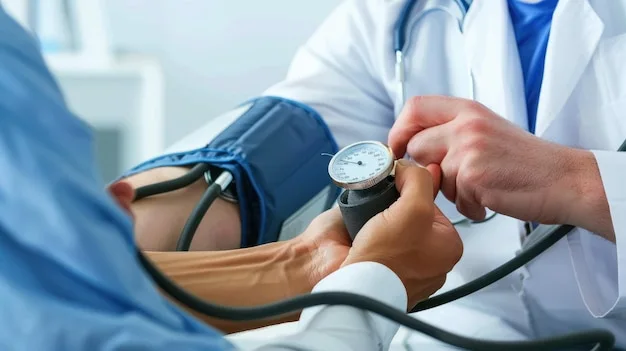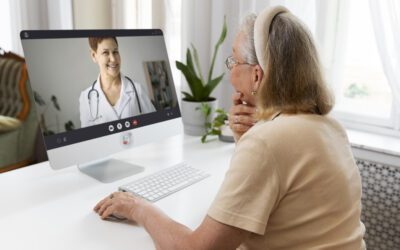Introduction:
Introduction:
Hypertension, commonly known as high blood pressure, is a major public health issue. According to the CDC, nearly half of adults in the United States have high blood pressure, with many unaware they have it. Despite being largely asymptomatic, uncontrolled hypertension can lead to serious complications, including heart disease, stroke, and kidney failure. This blog aims to explain the causes of hypertension, how to recognize its symptoms, and lifestyle changes you can adopt to prevent and manage the condition.
What Is Hypertension?
Hypertension occurs when the force of blood against the walls of your arteries is consistently too high. Blood pressure is measured using two numbers:
● Systolic pressure: The pressure in your arteries when the heart beats (top number in a reading).
● Diastolic pressure: The pressure in your arteries when the heart is at rest between beats (bottom number).
For adults, normal blood pressure is typically less than 120/80 mm Hg. A reading consistently above 130/80 mm Hg is considered high.
What Causes Hypertension?
Understanding the causes of hypertension is critical for managing and preventing it. There are two main types:
✥ Primary (essential) hypertension: This type develops gradually over many years with no specific cause, though several factors contribute:
● Genetics: If your family members have high blood pressure, you’re more likely to develop it.
● Age: The risk increases as you get older.
● Obesity: Excess weight increases the amount of blood required by the body, putting more pressure on artery walls.
● Diet: High salt intake, low potassium levels, and excessive alcohol consumption can raise blood pressure.
● Physical inactivity: Lack of exercise leads to higher heart rates, making your heart work harder and increasing pressure on your arteries.
● Chronic stress: Long-term stress can elevate blood pressure, especially when combined with unhealthy coping behaviors like smoking or overeating.
● Sleep deprivation: Poor sleep quality or sleep apnea can raise the risk of hypertension.
✥ Secondary hypertension: This type results from an underlying condition, such as:
● Kidney disease
● Thyroid disorders
● Sleep apnea
● Certain medications like birth control pills or decongestants
Symptoms of High Blood Pressure
Hypertension is often called the “silent killer” because many people don’t experience symptoms until the condition is severe. In some cases, individuals may have symptoms such as:
● Headaches
● Shortness of breath
● Nosebleeds
● Dizziness or lightheadedness
● Chest pain
● Vision problems
These symptoms generally occur when blood pressure reaches dangerously high levels. Regular check-ups are essential for early detection and prevention of complications.
How to Lower Blood Pressure Quickly
If you’ve been diagnosed with hypertension or experience a sudden spike in your blood pressure, it’s important to know how to lower it in urgent situations. While these tips may provide temporary relief, always follow your doctor’s guidance:
● Relax and breathe deeply: Stress can raise blood pressure rapidly. Sit in a quiet place and practice slow, deep breathing to calm down.
● Drink water: Dehydration can raise blood pressure. Staying hydrated helps maintain electrolyte balance.
● Eat potassium-rich foods: Foods like bananas, avocados, spinach, and sweet potatoes help regulate blood pressure.
● Limit salt intake: Reducing sodium intake can quickly lower blood pressure. Avoid processed or salty foods.
● Avoid caffeine: Caffeine causes a temporary spike in blood pressure, so it’s best to avoid it in high-stress situations.
● Walk or engage in light activity: Physical activity improves circulation and reduces stress, helping to bring blood pressure down.
How to Lower Blood Pressure Instantly in an Emergency
In an emergency, where blood pressure spikes above 180/120 mm Hg, it’s crucial to act quickly. While waiting for medical help, here’s what you can do:
✥ Lie down with your feet elevated: This helps reduce the pressure on your heart and arteries.
✥ Take prescribed medications: If your doctor has given you emergency medication for high blood pressure, take it as directed.
✥ Stay calm: Anxiety can worsen your condition. Focus on breathing slowly to lower stress levels.
✥ Call 911: In severe cases, such as when you experience chest pain, vision changes, or shortness of breath, seek emergency medical help immediately.
Lifestyle Changes for Hypertension
Preventing and managing hypertension requires long-term lifestyle changes. These adjustments can significantly lower blood pressure and improve heart health:
✥ Eat a heart-healthy diet: The DASH (Dietary Approaches to Stop Hypertension) diet is designed to lower blood pressure. It emphasizes vegetables, fruits, whole grains, and low-fat dairy, while reducing salt, red meat, and sugary foods.
✥ Reduce salt intake: Aim for 1,500 to 2,300 mg of sodium per day to lower your risk.
✥ Increase potassium: Potassium helps balance the effects of sodium, which can improve blood pressure.
✥ Exercise regularly: Physical activity is one of the best ways to manage blood pressure. Aim for at least 150 minutes of moderate-intensity exercise per week, such as walking, swimming, or cycling.
✥ Maintain a healthy weight: Losing 5-10% of body weight can have a significant impact on blood pressure if you’re overweight. To achieve and maintain a healthy weight, consider these effective exercises for weight loss treatment.
✥ Limit alcohol: Keep alcohol consumption moderate—no more than one drink per day for women and two drinks per day for men.
✥ Quit smoking: Smoking increases blood pressure and damages arteries. Quitting has immediate and long-term benefits for heart health.
✥ Manage stress: Chronic stress contributes to hypertension. Practices like yoga, meditation, and deep breathing exercises can help lower stress levels.
✥ Monitor your blood pressure: Regular at-home monitoring can help you stay on track and catch any fluctuations early.
Conclusion
Hypertension is a serious condition that requires consistent care. By understanding the causes, recognizing the symptoms, and making lifestyle changes, you can take control of your health and significantly reduce your risk of complications. In emergencies, knowing how to lower blood pressure instantly can be lifesaving, but always seek professional help in such situations.
At Georgia Family Care, we empower patients to make informed health decisions. If you’re concerned about your blood pressure or need guidance on lifestyle changes, our healthcare professionals are here to help you manage and prevent hypertension, ensuring a healthier future for you and your loved ones.
Frequently Asked Questions (FAQ)
1. What causes hypertension?
Hypertension is caused by factors such as genetics, obesity, unhealthy diet, lack of physical activity, stress, and chronic conditions like kidney disease or thyroid disorders.
2. What are the common symptoms of high blood pressure?
Most people don’t experience symptoms. When symptoms do occur, they may include headaches, dizziness, shortness of breath, nosebleeds, chest pain, or vision problems.
3. How can I lower blood pressure quickly?
To lower blood pressure quickly, try deep breathing, drinking water, reducing salt intake, walking, or eating potassium-rich foods like bananas. However, for emergencies, follow your doctor’s instructions.
4. How can I lower blood pressure instantly in an emergency?
In an emergency, lie down with your feet elevated, stay calm, take prescribed medications, and seek immediate medical attention if your blood pressure exceeds 180/120 mm Hg or if you experience severe symptoms like chest pain or vision changes.
5. What lifestyle changes can help prevent or manage hypertension?
Key lifestyle changes include eating a heart-healthy diet, reducing salt intake, exercising regularly, maintaining a healthy weight, limiting alcohol consumption, quitting smoking, and managing stress.
6. Can hypertension be cured?
Hypertension cannot be cured, but it can be managed with lifestyle changes and medication. Controlling blood pressure reduces the risk of serious complications.
7. Is high blood pressure dangerous if left untreated?
Yes, untreated hypertension can lead to severe complications like heart disease, stroke, and kidney damage. Regular check-ups and blood pressure management are vital.
8. How often should I check my blood pressure?
If you have hypertension or are at risk, regularly monitoring your blood pressure at home or during doctor visits is important. Ask your healthcare provider for the best schedule based on your needs.
Recent Posts
How Online Health Care is Revolutionizing Access to Care in Georgia, US
In the rapidly evolving landscape of modern healthcare, online healthcare has emerged as a...
How to Choose the Best Weight LossMedicine & Supplements Based on YourBody Type
Did you know that over 70% of American adults are considered overweight or obese? This alarming...
Effective Exercises for Weight Loss Treatment: From Lifestyle Changes to Daily Activities.
Effective weight loss treatment often involves a combination of approaches, with exercise playing...




